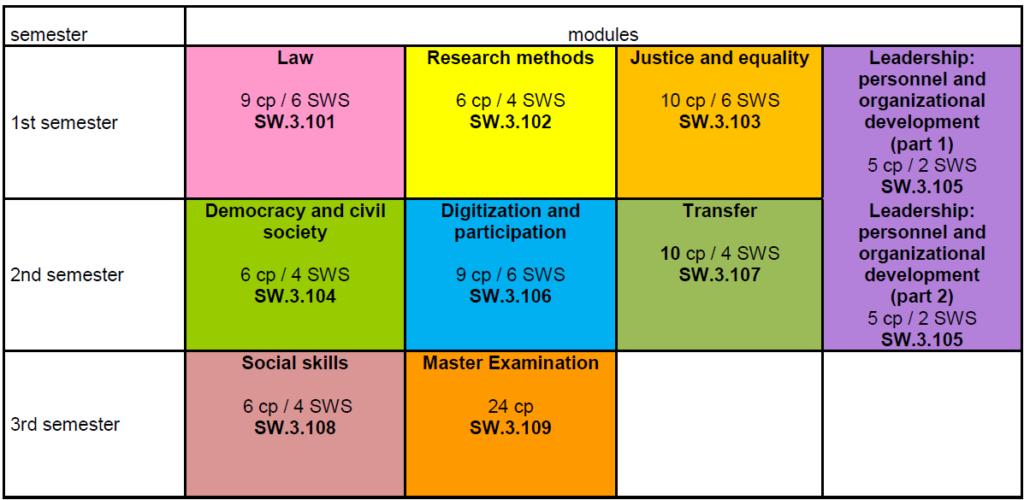Master of Arts: Civic Education. Democracy in digitized societies
Aim of the course
The aim of the course is to qualify graduates as multipliers of democratic competence. Graduates will be able to convey democratic values, democratic action and civil society in their respective (working) contexts by providing education and information to encourage sustainable engagement.
Graduates will be able to work in a democracy-promoting way with different target groups in the analogue as well as in the digital space. They will be able to prevent human rights abuses and ideologies that threaten democracy, to understand and analyse forms of social inequality and processes of inclusion and exclusion in a power-critical way.
Graduates examine the changing challenges in society according to scientific standards, evaluate them critically and derive a need for action. Graduates know the range of programmes and projects that promote civil society and democracy, especially in the state of Thuringia. They have the ability to analyse and critically evaluate the theoretical concepts, methods and effectiveness of these programmes and projects. They are able to independently develop, design, evaluate and implement concepts based on theories. Graduates are able to prepare and communicate democracy-promoting and political education content in a targeted, audience-oriented and comprehensible manner. They are able to promote inclusive educational processes and enable participatory practice.
Acquired skills
Acquisition of professional skills, especially in legal basics, democratic structures, on issues of equal rights, equal treatment and participation in the digital space.
Development of social skills, media and research skills.
Development of action skills: method-based, self-reflective and context-related.
Content overview
SW.3.101 Law
This module covers the national and international legal foundations of a liberal democratic society. This includes constitutional law, European law and international human rights protection. It also covers legal issues of civil society engagement, including the rights of marginalised groups and how these can be enforced.
SW.3.102 Research methods
The module provides an in-depth knowledge of qualitative and quantitative research methods in the social sciences.
SW.3.103 Justice and inequality
The module focuses on an interdisciplinary approach to issues of justice and equality. This is done at different levels, focusing not only on the individual but also on social groups and institutions (micro, meso, macro).
SW.3.104 Democracy and civil society
A comprehensive understanding of the basic functioning of democratic societies is the basis for democracy workers. Among other things, the module provides an insight into political processes, systems and actors, forms of civic engagement, electoral and counting procedures, or social movements and forms of political resistance.
SW.3.105 Leadership: personnel and organizational development
It is important for people in leadership positions to always have democratic processes in mind. This module therefore provides the necessary knowledge to implement democratic standards in line with human rights in one’s own organisation.
SW.3.106 Digitalization and participation
The enormous influence of digital technology has far-reaching implications for the political sphere. Therefore, this module deals with the consequences, dangers and opportunities of digitalisation for democracy and civil society, with a special focus on participation processes in the digital space. Possibilities and challenges in the digital design of participation processes will be highlighted and relevant tools (e.g. tools, platforms) will be taught.
SW.3.107 Transfer
In the transfer module, students gain exemplary insights into working in practice and apply their theoretical knowledge. The module is divided into two parts: In the lecture series, practitioners give an insight into their work. In the transfer phase, students work in a practical field of democracy work of their choice.
SW.3.108 Social skills
Democracy work thrives on contact with people and groups. In this module, in addition to personal skills, concrete methods for working with groups or evaluating one’s own work are taught and procedures for increasing social skills are discussed.
SW.3.109 Master Examination
In the Master’s thesis, students independently develop and carry out an empirical research project. This is related to a topic from the programme. In the Master’s thesis, students deepen their own research interests and relate them to the academic dis
Study plan
How to apply
Enrolment each summer semester, application between December 1st and 15th February.
Applications are submitted via the University’s online portal.
The teaching language is German (sometimes English).
More Information: https://www.sw.eah-jena.de/studium/ma-civic-education/
